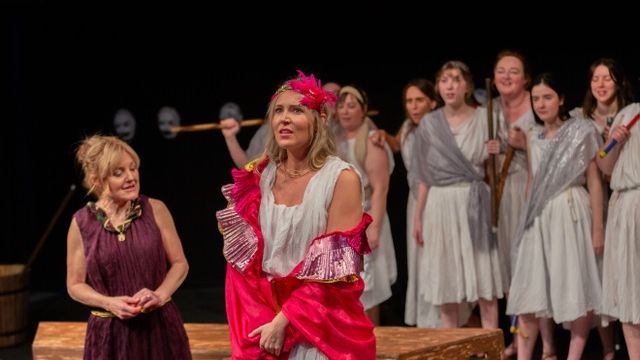The Penelopiad
The University of Adelaide’s latest production The Penelopiad takes us back to ancient Greece and gives an alternate view of Homer’s epochal novel, The Odyssey.
The Penelopiad by Margaret Atwood, based on her book, premiered with the Royal Shakespeare Company in association with Canada's National Arts Centre at the Swan Theatre, Stratford-upon-Avon, in July 2007.
Penelope - wife of Odysseus and cousin of the Helen of Troy has become a symbol of wifely duty and devotion, enduring twenty years of waiting when her husband goes to fight in the Trojan War.
While he is gone she fends off a hundred greedy suitors, travelling minstrels regale her with news of Odysseus' epic adventures, she slays monsters and grapples with amorous goddesses. When Odysseus finally comes home, he kills her suitors and then inexplicably hangs Penelope's twelve maids.
Penelope and her chorus of wronged maids tell their side of the story to set the record straight in this clever take on a classic tale.
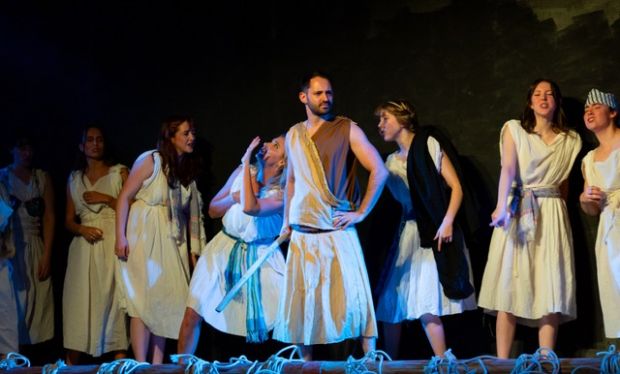
Director Kristin Telfer continues the tradition of Greek theatre by making the 12 maids a Greek chorus and strips the production to the bare bones on a set designed by Shannon Norfolk.
On the balcony there is a long wooden pole with 12 ropes attached. These ropes form the basis of the song ‘Weaving’ and serve as nooses for the hanging scene. On ground level is a long multipurpose bench, a table laden with props, 2 tubs of poles and 12 masks in black and white with their features distorted.
Telfer uses the space of the Little Theatre immersively with the action taking place on ground level, balcony level, in the aisles and behind the audience. Her maids, although part of the ‘Greek chorus’ all have clearly defined characters as themselves and the other characters they inhabit during the production.
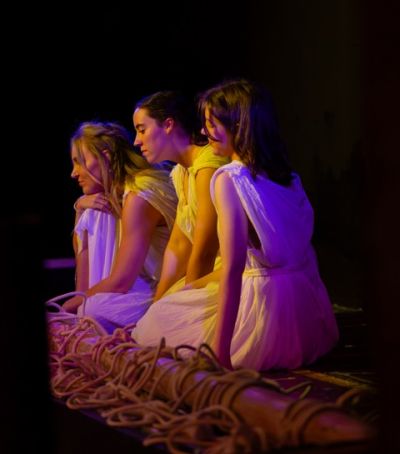
A highlight of this production is the music. Kristin Stefanoff’s original music is glorious, rich in harmony and sung well given that the performers are dramatic actors and not musical theatre performers. I particularly enjoyed ‘Daddy Went to Troy’ and the Cyclops song.
Shannon Norfolk’s costumes are simple, effective and reflect the clothing of the period while Jethro Pidd’s fight choreography adds realism to the fight scenes.
Stephen Dean’s lighting is colourful, highlighting the emotional aspects of the play.
Jane Ford’s Penelope is impassioned, measured and connects well with the audience. There are many long monologues in The Penelopiad and Ford handles them with ease. She treads the fine line of telling a story and giving a lecture and is barely off stage. It is a mammoth role
Theo Papazis’ Odysseus is self-obsessed, vain and unpredictable. Papzis plays the role earnestly and while this pays off, his Australian accent is distracting at times.
Frederick Pincombe’s Telemachus is young, full of fight and just wants to be taken seriously, a plight that still resonates with current teenagers and young adults. His facial expressions are riveting and draws the audience in.
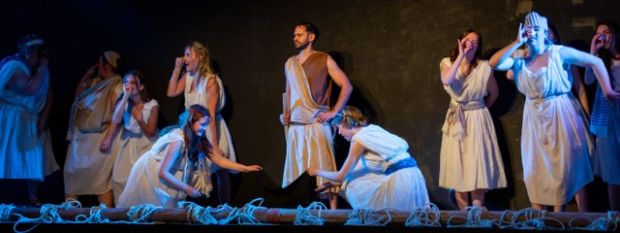
The twelve maids are the backbone of the production playing many roles and changing the set pieces. They comprise – Heather Crawford, Sophie Livingston-Pearce, Miriam Cwiek, Annie Matsouliadis, Emily Dalziel, Bonnie McAllister, Lucy Hay, Jessica Merrick, Macey Lawson, Olivia Jane Parker, Mia Livingstone-Pearce and Carmen Sinclair.
These twelve actors galvanise to portray a chorus or play multiple roles with ease. They are true ensemble players, supporting each other while giving convincing individual performances. Most of them went without makeup which added to the authenticity of the play. (I did find false eyelashes, and modern fingernail polish jarring for a play based on Greek history)
Overall, the structure of the play (lengthy monologues dispersed with action) at times results in a break in the ‘flow’ of the action. Also, a neutral accent from the whole cast would have seen a more unified approach as well as consistent projection as a number of lines were lost when the actors either had their back to us or the music overpowered their voices.
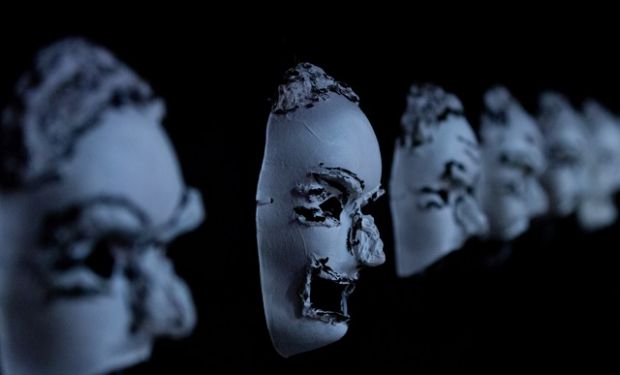
Having said that, I especially enjoyed the scenes on the ship, the weaving scene, and the visual effect of the hanging scene at the end of the play, very moving!
Penelopiad is a clever take on a classic tale. It ingeniously highlights the female perspective of a traditionally male dominated story, and gives the audience a glimpse of the real heroes of The Odyssey, the women!
Barry Hill OAM
Photo credit Maggie Morris
Subscribe to our E-Newsletter, buy our latest print edition or find a Performing Arts book at Book Nook.

